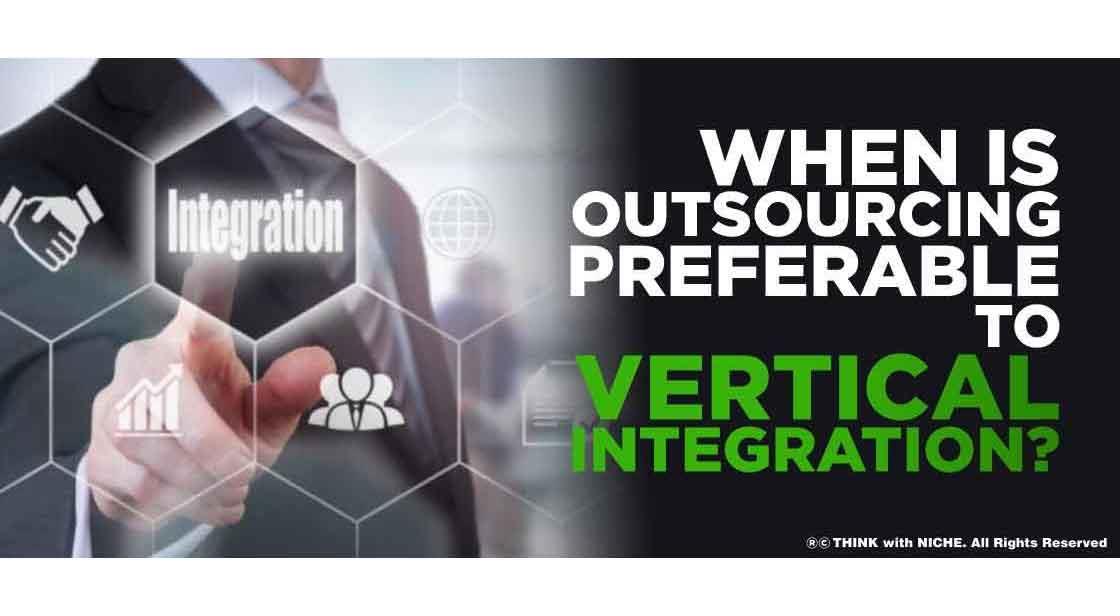When is Outsourcing Preferable to Vertical Integration?

Blog Post
For long-term corporate growth and development, vertical integration is usually the preferred method. Vertical integration is a business strategy in which a corporation buys or controls the operations of its suppliers, distributors, or retail locations to better control its supply chain, save costs, and increase efficiency. Vertical integration, on the other hand, is a time-consuming and costly procedure in practice. As a result, outsourcing may be a better alternative in some cases. We have discuss in this blog Vertical Integration Vs Outsourcing. #TWN
Outsourcing is the business practice of hiring another company to be responsible for a business function that could be done internally. Vertical integration helps most businesses save money and improve quality over time. The initial process of vertical integration demands a large expenditure of resources, which is a difficulty for small and medium-sized businesses. The goal of implementing a vertical integration or outsourcing plan is to increase the efficiency of a company's operations. Vertical integration will give some businesses a competitive advantage. Outsourcing is the most practical option for others. The decision to vertically integrate or outsource is influenced by the nature of the company's operations and the industry in which it operates.
Vertical Integration vs Outsourcing
Disadvantages of Outsourcing
Control
Outsourcing has the obvious downside of handing over control of some of your firm's management to another organization. The company to which you outsource may not have the same high standards as yours, and they will be motivated exclusively by profit. Furthermore, the outsourcing firm will be in charge of drafting a contract for their services.
Hidden Cost
If you don't have a thorough comprehension of the contract's provisions, there may be hidden expenses that aren't immediately evident. Companies that opt to outsource should also hire a lawyer to analyze (and maybe alter) the contract conditions.
Confidentiality
Another disadvantage of outsourcing is that when you release specific documents to another organization, your confidentiality may be jeopardized. You may be in danger of data leaks if another company has access to your payroll paperwork, medical records, or any other documents containing confidential corporate data. When deciding to outsource, a company should always take extra precautions to ensure that its data is secure.
Also Read: Top 9 Profitable Businesses in Maple Leaf
Advantages of Vertical Integration
The supply chain is divided into four stages:
- Commodities
- Manufacturing
- Distribution
- Retail
When a corporation owns two or more of these stages, it is said to be vertically integrated!
Vertical integration is the most significant benefit of preventing supply disruptions. Suppliers who are badly run can be untrustworthy. Strikes or labor conflicts can also have an impact on suppliers. Furthermore, if a business relies on a supplier with a monopoly in the industry, that supplier will be able to impose conditions (which could mean setting higher rates). A vertically integrated corporation can avoid dealing with suppliers who have a lot of market power. Vertical integration also has the benefit of lowering per-unit expenses. By integrating management, a larger firm may buy in bulk and save money on fixed costs. A vertically integrated retailer can also discover popular brand-name items create "knock-off" store-brand items using the same materials and manufacturing method, and sell them to customers at a reduced cost. The most obvious benefit of vertical integration is that it saves money for a company, which can then be passed on to customers in the form of lower costs.
Also Read: What Exactly Is A Small Business?
Conclusion
Outsourcing has become contentious in recent years. Opponents of outsourcing argue that it results in the loss of jobs in the United States. Outsourcing proponents claim that it encourages companies to spend resources where they are most cost-effective. In industries where personnel and capital resources are expensive, outsourcing makes the most sense. Manufacturing enterprises, for example, frequently use outsourcing due to the high expense of keeping labor and the expensive machinery required in the industry. Vertical integration is difficult to achieve. In some circumstances, firms may be better off outsourcing—and relying on the expertise of others—rather than vertically integrating.
Related Blogs
You May Like
EDITOR’S CHOICE














